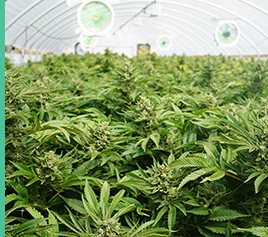Get A Quote
Cannabis businesses are subject to more business risk than most.

The Cannabis market continues to grow. Although there is no federal mandate on cannabis sales, in the states where sales were legal, business is booming. By some estimates, the industry made over $25 Billion in sales with estimated growth expected to reach $146 Billion by 2025.(1) Given the growth of the newness of some of the potential risk exposures, one thing is clear. Cannabis businesses have more risk than others.
Cannabis businesses have substantial risk of exposure to losses, especially theft, lost property and business income before any consideration of legal or regulatory hurdles. Because there are no federal mandates and the fact that cannabis at is considered a class 1 drug, many of the legal growers are forced to conduct local sales and are often limited by geography and aggregation that other industries are limited to. Some typical exposures such as property damage due to irrigation, air conditioning, fire and windstorms are complicated by theft. Many cannabis companies keep significant amounts of cash on hand since national banks will not allow deposits or balances involving these businesses. This makes cannabis businesses valuable targets for thieves. Additionally, since many small shops lack controls larger companies have, employee theft is noticeably higher in the cannabis business.
Denver and the State of Colorado passed a security law for 2022, after a rash of thefts and break ins, in the over $700 million dollar market. “Since Jan. 1, Denver medical and recreational dispensaries have been required to have at least one safe for marijuana products and cash that is secured to the building and in an area with limited access.”(2) Among other measures, they need cameras on their store fronts and in the trucks that dispense them, creating more of a burden on the dispensaries.
Another point of concern revolves around the technology and systems handling their money. Because interstate commerce is not allowed within the cannabis business, either shipping or monetarily, growers not only have to ship it intrastate but all their sales have to be physical and mostly local. Moving a Class 1 drug across state lines creates and even bigger Federal problem. They are limited in their sales distribution, must spend more money to protect their product and pay higher taxes than other industries
Two of the biggest problems facing dispensaries and their product security is the fact that they need to be secured in a location that is not accessible to the public when its off hours. In the case of security, they can easily be robbed or destroyed as many facilities are not in high traffic monitored locations. In the many protests that occurred in 2020, many stores that were looted included dispensaries because they could and did break into them while the chaos was unfolding and cash was located on site. In one instance, a rioter broke into a business and removed the bolted safe, walking out the door with over $200,000 in the safe.
The fact this business is largely a cash only business, they are also often more vulnerable to internal robberies than external. With as much money flowing through these businesses, employees can simply swipe the cash. One further issue in Cannabis companies is that they experience a higher turnover rate than most businesses and a higher-than-average employment practice liability exposure. Baring that, EPLI becomes a factor when dispensaries are sued for the usual suspects such as wage loss, wrongful termination and even workers comp. Employers must take care of limiting who has access to their products and cash.
Lastly, in terms of weather, it is a big concern with the green houses. The biggest dangers in many of these states are wildfires, especially in Colorado, California, and Oregon where the current drought conditions have made some of these farm’s tinderboxes. However, other issues that growers have is similar to any other grower, including bad crops, lack of proper irrigations, improper lighting, air conditioning or ventilation. Extreme weather such as windstorms, blizzards, and flooding can create further risk and exposure. A major concern of course storing is them and growing them in their greenhouses, which can be destroyed if they aren’t built correctly or in a location that can expose them to elements (3)
Cannabis sales are currently climbing at an astronomical rate. With growth comes challenges such as securing the proper insurance to protect their enhanced risk. Contact us for our insight:

